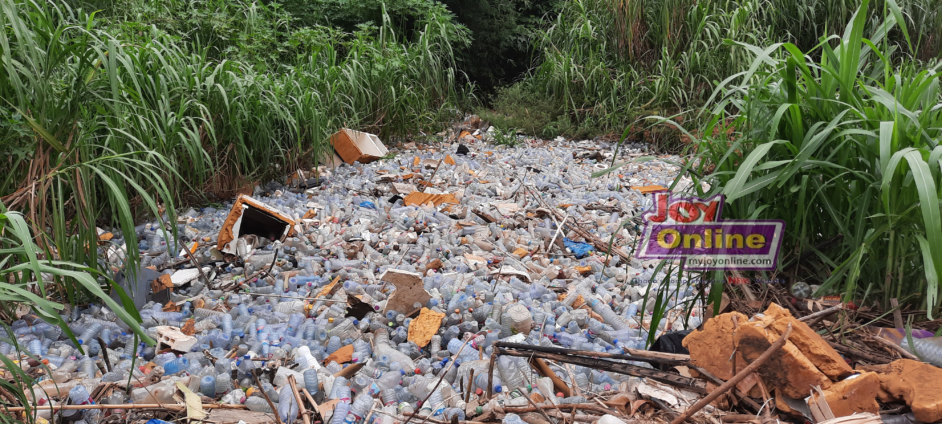The Centre for Climate Change & Food Security (CCCFS), a non-governmental organisation, is advocating the adoption of ceramic materials for domestic usage as the country fights the devastating consequences of plastic pollution.
Although peculiar to some small towns and villages in Ghana’s regions of the north, ceramics usage has not been encouraging since the introduction of plastics which have been found to be detrimental to the environment.
In a newsletter, Executive Director of CCCFS, Engr Mahmud Mohammed-Nurudeen, emphasized that reviving this practice could significantly reduce Ghana’s reliance on plastics.
“CCCFS is drawing inspiration from India's successful adoption of ceramic materials for drinking water, particularly in states like Rajasthan, emphasizing the need for a return to traditional, sustainable practices,” he said.
This comes on the heels of the celebration of Earth Day globally on the theme, “Planet vs. Plastics, highlighting the enormous negative impact single-use plastics have on our environment”.
Ghana produces around 0.84 million tons of plastic waste each year with an annual average increase of 5.4%, according to official data.
It is postulated that population growth is commensurate with plastic waste, with an annual projection of 2.2%.
The amount of plastic consumed per person is also increasing by 3.4% each year.
Despite efforts by the government, industry, and civil society, plastic waste in water bodies is expected to increase by 190% between 2020 and 2040.
The influx of plastics is posing a threat to human existence and the ecosystem including pollution of oceans and waterways, harm to marine life, and contribution to climate change.
Engr Mohammed-Nurudeen revealed the deleterious effects of the organic materials to the food chain with eventual threat to human health.
“…some of this plastic waste eventually enters the food chain, posing a significant risk to human health. When plastic debris breaks down into smaller pieces, known as microplastics, they can be ingested by small marine animals, which are then consumed by larger animals, and potentially even humans.
“This means that plastic pollution has the potential to contaminate the food we eat, leading to harmful health consequences,” he said.
CCCFS is worried many Ghanaians remain unaware of the harmful effects of plastic waste.
"The impact of plastic pollution on our environment, our health, and our economy cannot be overstated. We must take immediate action to reduce plastic waste and adopt sustainable practices. We owe it to ourselves, our children, and future generations to act now."
The centre wants drastic reductions in plastic production by petrochemical companies.
“CCCFS is calling on petrochemical companies, policymakers, and individuals to join forces in the fight against plastic pollution. Together, we can make a difference and create a cleaner, healthier, and more sustainable future for all,” Engr Mohammed-Nurudeen said.
Latest Stories
-
Thomas Partey stunner helps Arsenal overcome Nottingham Forest
8 mins -
Over half of cyber attacks in Ghana, rest of Africa target government and finance, says Positive Technologies
11 mins -
Academic City unveils plastic recycling machine to address plastic pollution
28 mins -
German-based Kanzlsperger makes medical donation to WAFA
2 hours -
It could take over 100 years for Ghana and other African countries to become ‘developed’ – Report
2 hours -
AEC 2024 renews momentum to lift Africa out of poverty despite global shocks
2 hours -
Can RFK Jr make America’s diet healthy again?
2 hours -
Maiden Women in Chemical Sciences conference opens with a call for empowerment
5 hours -
We’ll reclaim all Groupe Nduom stolen assets – Nduom declares
5 hours -
Center for Learning and Childhood Development Director Dr Kwame Sakyi honoured at Ghana Philanthropy Awards
14 hours -
Asantehene receives 28 looted artefacts
15 hours -
CAF WCL 2024: Ghana’s Thelma Baffour wins title with TP Mazembe
16 hours -
Benjamin Boakye slams politicisation of energy sector issues and ECG’s inefficiencies
16 hours -
Erastus Asare Donkor and Dr Neta Parsram win big at 10th Mining Industry Awards
16 hours -
Government is “suppressing information” about power sector challenges – IES Director
16 hours

